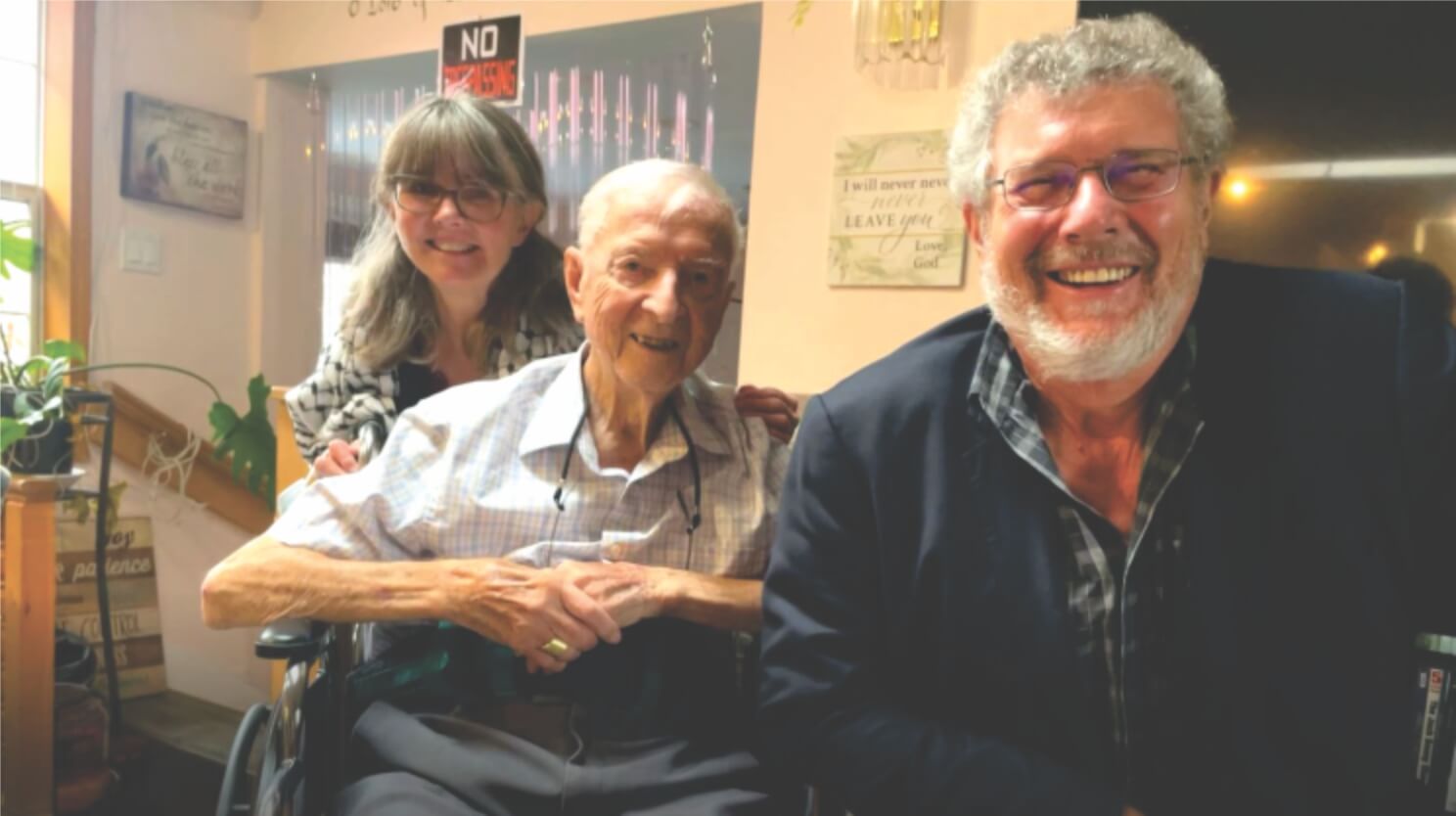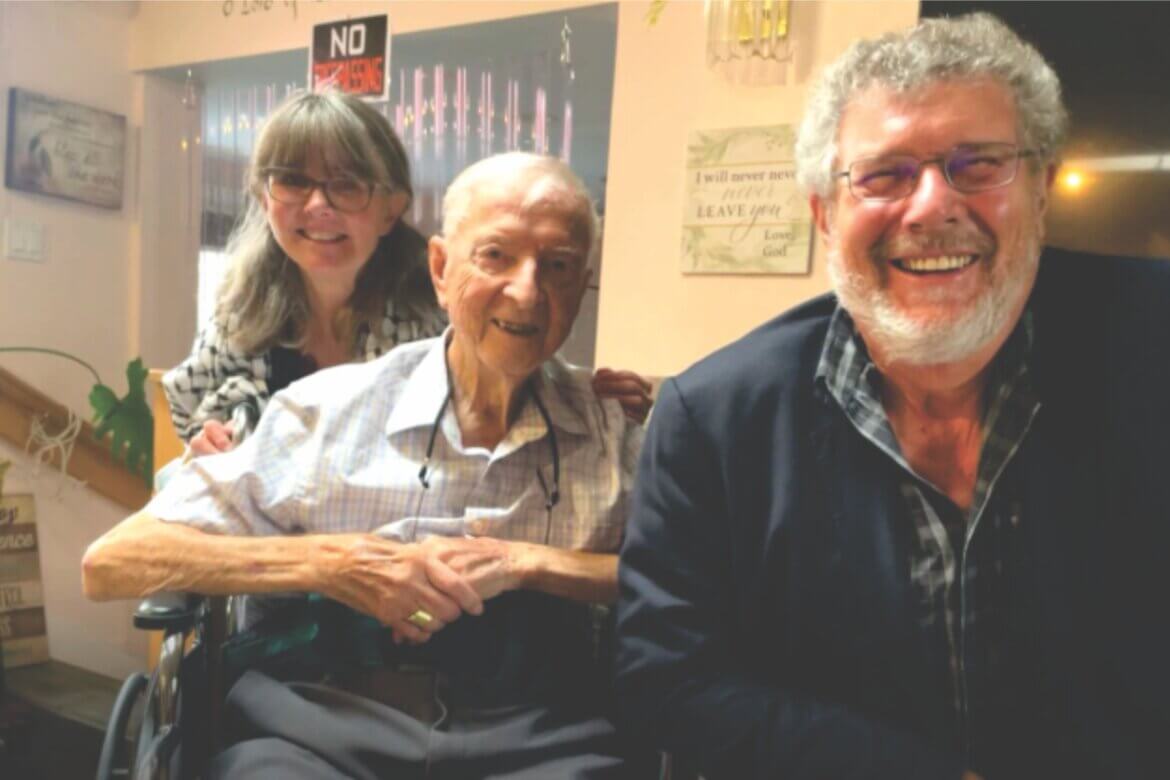Last Interview with Remi De Roo Digs Into Issues
David Szollosy, Toronto (with Lauretta Amundsen)
Volume 37 Issue 1, 2 & 3 | Posted: April 1, 2022

On June 8 of last year, former staff member for Bishop Remi J. De Roo, Dave Szollosy conducted an interview with the bishop for the Rogers community television show, “Politically Speaking.” It proved to be the last public interview the very media-savvy prelate would give.
The following October, Dave Szollosy met with the bishop and when they spoke about the interview, Bishop De Roo expressed his interest in having it transcribed into a print interview. The following is a condensed and edited version of the June conversation.
It is important to emphasize the importance of the very significant event for the Catholic Church and the world which took place in the 1960s. The Second Ecumenical Council of the Vatican, commonly known as Vatican II, addressed relations between the Catholic Church and the modern world. Bishop Remi J. De Roo, Bishop Emeritus of Victoria, British Columbia, was the last surviving bishop to have participated in all sessions of the Second Vatican Council. He continued speaking about the Council and its impacts long into his retirement. The Rogers interview started with his recollections of that important event.
DS: Can you describe the importance of the Second Vatican Council for that period of history? What was going on in the world and in the Church to cause there to be a need and an appropriateness for the Council?
RDR: There was a renewal in the world and in the Church. Pope Pius XII had addressed those issues. Many societies were trying to come back to normal after World War II.
DS: What were your impressions at the time of what was going on?
RDR: There was excitement about coming together to talk about what was happening in society. There was an awakening to a new theology which scared a lot of people in the Vatican who weren’t accustomed to thinking that the Church might evolve because for them the Church was the perfect society and unreformable.
Most of the bishops had never met one another, many of them were not well enough read to be sensitive to what was happening. The Church had been in a situation of negativity and condemnation. The world was searching for universal peace, for more justice.
DS: In an article by Vancouver Sun columnist Douglas Todd, he suggests “the jury is out on whether Vatican II has achieved its goals. Many believe the reforming movement you took part in building has been resisted by popes John Paul II and Benedict XVI.” Is that what happened to the spirit of the Council?
RDR: Yes! The reforms of Vatican II were resisted by successive popes John Paul II and Benedict XVI. Some forms were subtle.
DS: Todd also recounts a conflict you had with then Cardinal Ratzinger (later Pope Benedict XVI). You had just spoken at a U.S. conference about the need for a dialogue over ordaining women to the priesthood. Ratzinger called you to Rome to admonish you.
RDR: The issue of the ministries of women in the roles in society was of such importance that it merited the communal spiritual discernment of the whole people of God, not just the hierarchy. I think that’s what rumpled him the wrong way, the thought that the members of the Church could have anything to say in the future of the Church. Yes, rather severe. It surprised me.
I was surprised and somewhat offended at the tone of voice of Ratzinger at the time. I think he was missing the point of what was going on. For him, there was no such thing as dialogue with the world. It was just direct condemnation and strict instruction to women not to speak up.
DS: Are you responsible for the Vatican attempt to declare the matter of ordaining women closed?
RDR: No.
DS: One of the impacts on the Church in Canada was the importance given to national and regional conferences of bishops and the subsequent creation of bishops’ commissions like the Social Affairs Commission of the Canadian Conference of Catholic Bishops. You chaired that body for a number of years. What would you identify as some of the highlights from that time and from the work of the commission? I know that former Prime Minister Pierre Trudeau was not a fan of the statement on the Economy.
RDR: That’s correct. His response was rather nasty, but that didn’t bother us from going ahead and doing our work.
DS: Various Catholic commentators have reflected on Pope Francis’ goal of implementing the reforms of the Second Vatican Council. Is there a renewal movement regarding Vatican II taking place?
RDR: Francis has certainly picked up on that. I think there’s a very good example of a pope who not only listens to the people, but listens with his heart as well as with his head and his ears.
There’s two sides to this issue, two aspects. There’s the one of enthusiasm and hope for the future that has arisen to some extent through the Council. The other one of fear and evasion and condemnation on the part of those who really see the world as a sinful place to be fought rather than cooperated with.
DS: Is the opposition to Francis’ agenda that we see in some circles, especially in the United States, really a continuing opposition to the reforms of Vatican II?
RDR: It is a vocalization, a coming out into the open of the people who really don’t believe that the Church should be listening to people.
DS: In 1994 you tried to have a conversation with Pope John Paul over the benefits of ordaining married clergy. He did not receive it well and declared, God will provide! Now under Pope Francis with there were great expectations coming out of the Amazon Synod to normalize married priests. Although that was not contained in his statement following the synod input, is there more openness today to the concept than when you addressed it with Pope John Paul?
RDR: Particularly we are beginning to see, in dialogue with the other churches, that the present situation is untenable for a variety of reasons. One of them being that the Church is not giving the kind of pastoral leadership which is required.
I am happy to see what Pope Francis is doing in terms of listening, not only with his ears but listening with his heart. I think it is very important for people to sense that the primary thing we must do is love one another, rather than compete with one another, and bring about justice as the prophets of old reminded us.
DS: I have to address with you the recent discovery of 215 children’s graves at the Kamloops Indian Residential School and ask you for your comments. You were bishop of the Victoria Diocese while residential schools still operated there on Kuper Island.
RDR: The discovery is something horrendous. It has certainly caused us to re-examine where we are at and what the purpose of education is. It’s an extremely complex situation but I believe it merits a very conscientious examination of what had really happened.
DS: A number of years ago, I predicted that by the time I would retire that I would not be retiring from working in the Catholic education system because it would no longer exist. I also predicted that I would not be able to be buried in the Catholic Church because it would not exist by then. So far I am 100% wrong. Will my second prediction come true? And if the Church is to survive, what are the greatest challenges it must overcome?
RDR: The future is very clear. I am myself quite serene and confident that despite the problems, the Spirit is at work. I’ve seen the Spirit at work now for 96 years so I think I speak from experience, so I would say I am inclined to be an optimist.
DS: In reflecting on your long and very active career in social justice, in human rights and in connecting the church to working people’s realities, what would you identify as your most significant contribution and want to be recognized as your legacy?
RDR: First of all, listening. I believe in the presence of the Holy Spirit. I believe that the example of Jesus Christ, through the power of the Holy Spirit, is continuing on. Know that as long as we pursue the road of justice, peace, and truth, we’re on the right path. If we stumble occasionally, that is perfectly quite human.
DS: There are calls from certain groups that it is time for a Third Vatican Council. How do you respond to those voices?
RDR: We do not need or want another Council at this point for a number of reasons. One of them being that the truly influential, many of the truly influential people in the Church, are not encouraging the promotion of a Vatican III. I think that rather than another Council, we need a determined effort to re-implement all that Vatican II brought.
We live the Council again by paying more attention to what happened there. Let’s continue on and do our best to continue living the heritage we’ve already received and the heritage which is unfolding.
Dave Szollosy was formerly the Director of the Office of Social Justice for the Diocese of Victoria. He is now retired from teaching and his role as a union official.
David Szollosy, Toronto (with Lauretta Amundsen)

